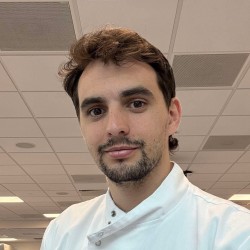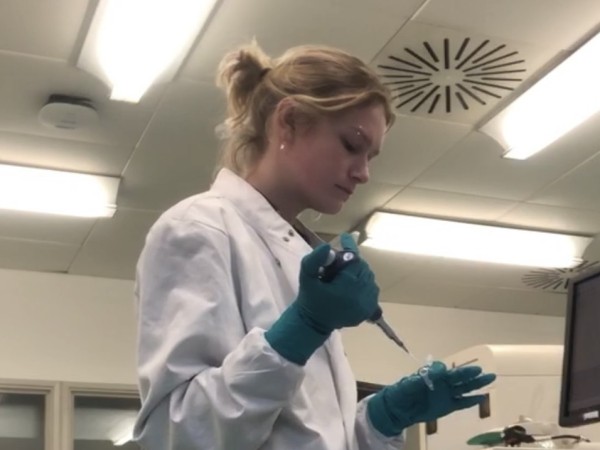
George Mayson
"I studied at Surrey for my MSci in Biochemistry, where my project focused on tuberculosis infection. The research was very successful and continued through the summer after I had graduated. The combination of an exciting PhD project and a fantastic group of scientists confirmed my choice to continue at Surrey."
Course
Biosciences and Medicine PhDPlease provide a brief synopsis of your research project.
Despite recent advancements in diagnosis and treatment, tuberculosis remains the deadliest infectious disease globally. Mycobacterium tuberculosis (M. tuberculosis) persists for decades within its host, demanding metabolic adaptation to fluctuating nutritional environments. An emerging paradigm is that nutrient conditions impact bacterial survival under host-imposed stresses, including antibiotics, yet exactly how these nutrient fluctuations impact mycobacterial survival is unknown. My PhD explores the physiological effects of switching between carbon sources, by assessing mycobacterial growth, metabolism and antimicrobial susceptibility.
Why did you choose to study at Surrey for your PhD?
I studied at the University of Surrey for my MSci in Biochemistry, where my project focused on the influence of lipid supplementation on macrophage survival during M. tuberculosis infection. I was amazed at how M. tuberculosis could survive and grow within the very cells designed to eliminate them, and how the addition of nutrients could have such a major impact on infection outcome. The research was very successful and continued through the summer after I had graduated. This provided me with the opportunity to meet Dr Dany Beste and Professor Melanie Bailey, as well as the amazing scientists within their teams. The combination of an exciting PhD project and a fantastic group of scientists confirmed my choice to continue at Surrey.
Why are you passionate about your area of research?
I am passionate about the survival strategies of M. tuberculosis and exploring such a diverse and complex pathological system. Despite being one of the first bacterial causes of disease, M. tuberculosis remains the world’s most lethal, single infectious agent. Astoundingly, even with the advancements of the 21st century, millions of people are dying of tuberculosis – a treatable disease – every year. Within my research I aim to better our understanding of mycobacterial mechanisms of drug tolerance, in the hope of discovering novel therapeutic strategies to curb the tide of tuberculosis.
"I am beyond ecstatic about my upcoming research visit to Yale University. It will allow me to enhance my technical skills and form a collaboration between the groups of Dr Beste at the University of Surrey and Dr Hesper Rego at Yale University, promoting continued, joint scientific research."
Have you had opportunities to collaborate with others during your PhD?
My PhD project is interdisciplinary and highly collaborative, bridging microbes, infection and immunity together with the Chemistry department. My work involves basic microbiology, but also the development of single-cell multi-OMIC approaches in combination with analytic chemists.
I am beyond ecstatic about my upcoming research visit to Yale University, in the United States. I’ll be exploring my research on nutrient shifting with fluorescent reporter strains of mycobacteria and utilising microfluidic-assisted, super-resolution time-lapse microscopy alongside an AI data analysis pipeline. This research visit will allow me to enhance my technical skills and form a collaboration between the groups of Dr Beste at the University of Surrey and Dr Hesper Rego at Yale University, promoting continued, joint scientific research.
What support have you had?
I am incredibly fortunate to have such supporting supervisors in Dr Dany Beste and Professor Melanie Bailey. Dr Beste has always been available to provide guidance and open scientific discussion to progress my research. She was also instrumental in arranging and securing funding for my research visit to the US. Professor Bailey has similarly supported my PhD progress and facilitated my wildly ‘creative’ ideas within the SEISMIC facility.
There is also a fantastic research culture within the wider microbiology section at the University of Surrey, where fellow PhD students, experienced researchers and senior academics offer insight and support to progress one another’s projects.
What do you plan to do once you've finished your PhD?
After my PhD, I plan to apply for a fellowship to continue my research and develop my own independent career, whilst maintaining all the wonderful connections and scientific collaborations I’ve made throughout my PhD.
Find out more about Biosciences and Medicine PhD.


